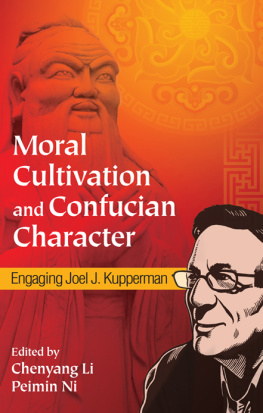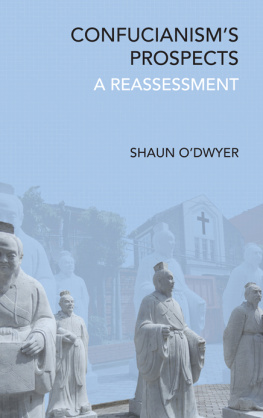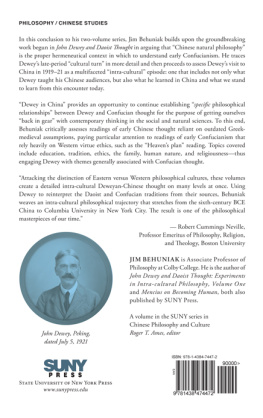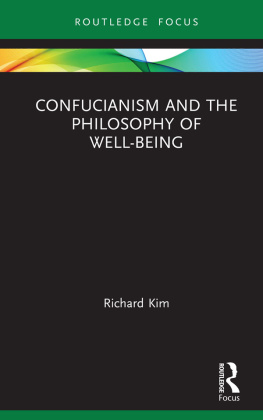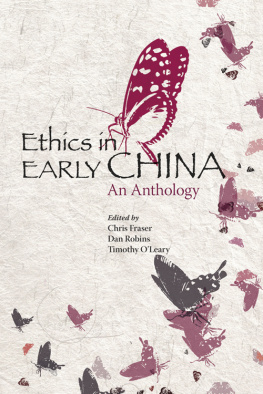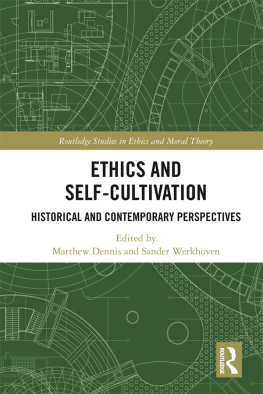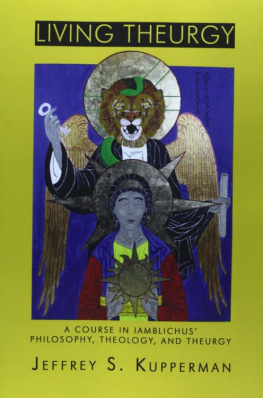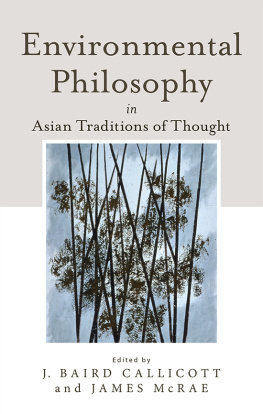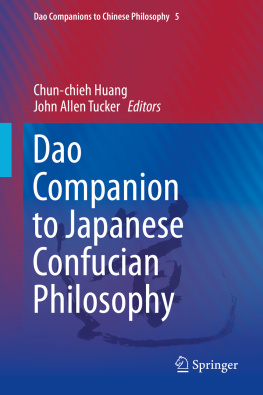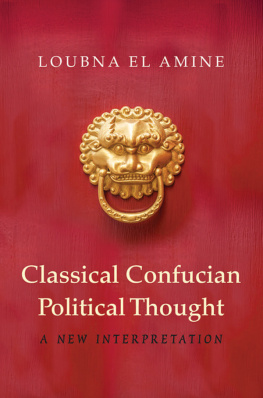Moral Cultivation and Confucian Character
SUNY series in Chinese Philosophy and Culture
__________
Roger T. Ames, editor
Moral Cultivation and Confucian Character
Engaging Joel J. Kupperman
Edited by
Chenyang Li and Peimin Ni
Cover art woodcarving portrait of Joel Kupperman courtesy of Michael Kupperman
Cover art: background image Leshabu / Dreamstime.com and Confucius image Liang Zhang / Dreamstime.com
Published by State University of New York Press, Albany
2014 State University of New York
All rights reserved
Printed in the United States of America
No part of this book may be used or reproduced in any manner whatsoever without written permission. No part of this book may be stored in a retrieval system or transmitted in any form or by any means including electronic, electrostatic, magnetic tape, mechanical, photocopying, recording, or otherwise without the prior permission in writing of the publisher.
For information, contact State University of New York Press, Albany, NY
www.sunypress.edu
Production by Diane Ganeles
Marketing by Kate McDonnell
Library of Congress Cataloging-in-Publication Data
Moral cultivation and Confucian character : engaging Joel J. Kupperman / edited by Chenyang Li and Peimin Ni.
pages cm. (SUNY series in Chinese philosophy and culture)
Includes bibliographical references and index.
ISBN 978-1-4384-5323-1 (hardcover : alk. paper)
1. Ethics.2. Character.3. Confucianism.4. Kupperman, Joel J. I. Li, Chenyang, 1956, editor of compilation.
BJ1521.M765 2014
170dc23 | 2013045657 |
10 9 8 7 6 5 4 3 2 1
To Joel,
A mentor and a junzi
Contents
Fred Dallmayr
Chenyang Li and Peimin Ni
Roger T. Ames and Henry Rosemont, Jr.
Philip J. Ivanhoe
Bryan W. Van Norden
David B. Wong
Kwong-loi Shun
Robert Cummings Neville
Chenyang Li
Sor-hoon Tan
Peimin Ni
Karyn Lai
Joel J. Kupperman
Acknowledgments
We would like to thank the following individuals for their contribution to the making of this volume: Paul Bloomfield, who organized the Character: East and West conference in honor of Joel Kupperman at the University of Connecticut in Storrs, on May 20 and 21, 2011, which provided a valuable venue to us to discuss Joels work and to contemplate this project; Roger Ames, for his able assistance with the mini-conference that we organized in honor of Joel Kupperman, held in conjunction with the Tenth East-West Philosophers Conference in Honolulu, on May 23 and 24, 2011; Karen Kupperman for her persistent help along the way; Michael Kupperman for his professional drawing of Joels portrait that appears on the cover of this book; Li Jifen and Sun Qingjuan for their technical assistance with the preparation of the manuscript; Jonathan Sim for assisting with proofreading and for preparing the index; and at SUNY Press, Nancy Ellegate, our acquisitions editor, for her guidance along the way; Jessica Kirschner, for her timely assistance. Diane Ganeles and Kate McDonnell, for their efficiency and professionalism in handling respectively the production and marketing of this book. This project was supported by a generous grant from the Centre for Liberal Arts and Social Sciences of Nanyang Technological University (NTU) and NTU research grant M4080394. Finally, we thank our respective family members, Ying and Sophie (for Peimin), Hong, Fay and Hansen (for Chenyang), for their continuous understanding, support, and love. The long-lasting friendship between these two families is traceable all the way back to our student years under the guidance of Joel Kupperman.
C. L., P. N.
Foreword
F RED D ALLMAYR
The political thinker Hannah Arendt once remarked that the task of responsible human agency is to think what we are doing. What this comment endorses or recommends is neither the descent into mindless activism nor the escape into abstract metaphysics, but rather a continuous learning process where thought is seasoned through practical experience. The recommendation, one can readily see, had a critical edge: it opposed the prevailing dichotomy (in the West) between rationality and arbitrary whima dichotomy undergirding the equally glaring hiatus between the academy and public life. Fortunately, in our time, Arendts position is no longer an isolated exception: her plea to reconnect thinking and doing finds resonance in several contemporary philosophical perspectivesincluding above all the perspective of virtue ethics which by now has a global or cross-cultural reach. By contrast to the focus on invariant principles or private emotions, virtue ethicsfrom both an Aristotelian and an Asian/Confucian vantage pointemphasizes the reflective cultivation of practical life, that is, the ethical shaping of human conduct in its relation to fellow-beings and the world.
The present volume pays tribute to Joel Kupperman as a scholar, teacher, and practitioner of virtuous life. As reflected in his writings, teachings, and personal interactions, Kupperman is one of those all-too-rare people: an individual who practices what he preaches, whose everyday conduct exemplifies in a concrete manner the meaning of the legacies he investigates and transmits. I was not fortunate enough to be closely acquainted with Kupperman; but even my limited contacts (at conferences and on other occasions) convinced me that I was in the presence of a knower/doer, of an erudite expert on ethical philosophy who allowed his learning to infiltrate and pervade his persona or character. Together with many colleagues and probably with all of his students, I benefited from this exposure to a life well lived, to this concrete exemplification of virtue in our time.
As the assembled contributions to this volume show, the precise meaning of virtue ethics, in both the Aristotelian and the Confucian traditions, is a matter of debate and allows for different readings. In this debate, Kupperman himself placed an accent on the formation of character in ethical conduct, an accent which departs to some extent from role conceptions (as well as other conceptions) of virtue. As it seems to me, however, these different accents do not cancel a deeper commonality: the recognition that role performance depends on the cultivation of personal dispositions which, in turn, are shaped by interpersonal contexts. Perhaps, such a linkage of form and content, of outside and inside, best captures Kuppermans harmonious approach. No matter which accent one prefers, however, the fact remains that his work has given new impulses to a great variety of interpretations and thus provided a boost to the reinvigoration of virtue ethics in a global setting. For this service, we allWestern and Asian comparativistsare deeply indebted and grateful to him.
Introduction
C HENYANG L I AND P EIMIN N I
This volume grew out of two events in celebration of the fiftieth anniversary of Joel J. Kuppermans teaching career in philosophy. The first was Character: East and Westa Conference in Honor of Joel Kupperman, organized by the Philosophy Department of the University of Connecticut, in Storrs, on May 20 and 21, 2011. Joel Kupperman, David Wong, and the editors of this volume were among the attendees. The second event was a mini-conference in honor of Joel Kupperman, held in conjunction with the Tenth East-West Philosophers Conference in Honolulu, on May 23 and 24, 2011. The mini-conference was organized by these editors, attended by Roger Ames, Henry Rosemont, Jr., Karyn Lai, Kwong-loi Shun, Sor-hoon Tan, whose papers are included here, and Joel Kupperman. Other invitees to the mini-conference, Philip J. Ivanhoe, Robert C. Neville, and Bryan Van Norden, although unable to attend, have graciously made their contributions to this volume in honor of Kupperman.

